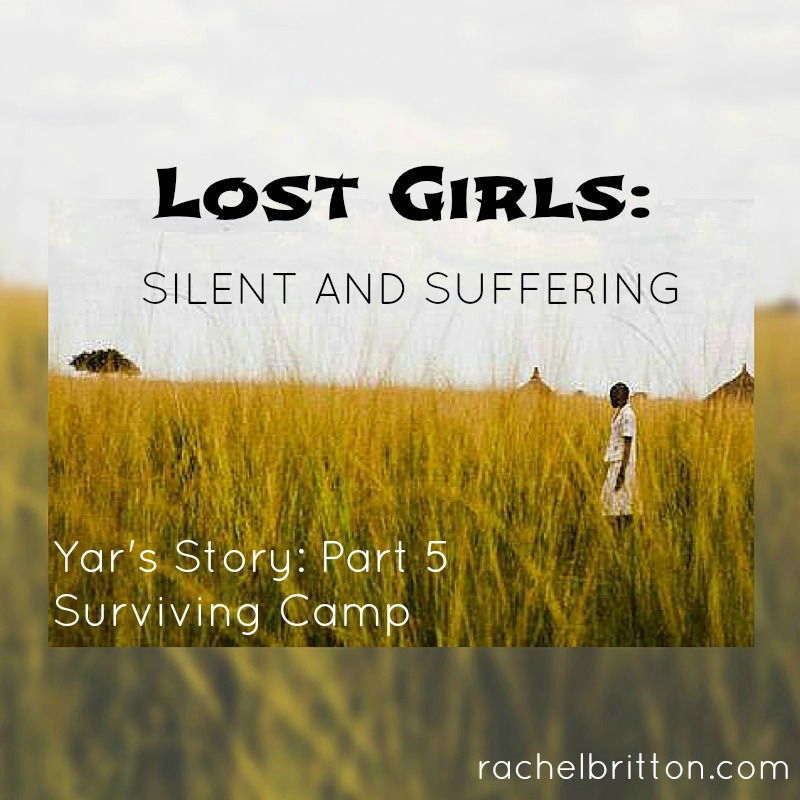So far, Yar journeyed hundreds of miles by foot to Ethiopia, back to Sudan, and then into Kenya, where she settled with thousands of other Sudanese in Kakuma refugee camp. For the first time in years, she received food, although only in scant quantities, on a regular basis. She slept with a ‘roof’ over her head. She even attended school, something she and many of the other children, particularly the girls, had never had the opportunity to do before.
In time, we were provided with an education—even the girls. By American standards, the quality of schools was frightfully poor.
Over 100 children shared one book. The bare, dusty floor served as our notebook and a jagged stick as a pencil.
The quality may have been lacking, but it was my first taste of education.
I only skipped class to line up for rations. Nothing else kept me from school, not even the diseases that ran rampant through camp.
Being in camp meant I no longer had to hide in trenches and worry about bombs. I lived in relative peace. Instead, other threats permeated my life—my thoughts.
When darkness fell and I slipped toward sleep, I mourned the loss of my father. I missed the comfort of his guiding hand.
Like any child, I missed my mother, too, and wondered if she was alive. I thought about the baby in her belly, and, also about my older sister.
My thoughts moved to the inner recesses of my aching heart until the soaring heat of the rising sun awoke me in the morning. There was no time for sorrow and self-pity during daylight.
My brother and I were in care of a female relative, whom we call Aunty. My brother was too young to live in the boys’ minors group. Aunty had four children of her own.
My brother and I had a “size two” ration card (two people on the same ration card). We received 26kg of wheat flour, 10kg of dry maize or corn, 454g of lentils, 2 tsp. of salt, 2 cups of oil, and 454g of dry beans.
The food was distributed twice a month. It meant if you consumed your food before fifteen days, you would go hungry until the next round of rations. I came up with a plan to have one meal a day, so my brother and I could make it through the next fifteen days.
Sometimes I exchanged lentils or wheat flour for money, so I could buy shoes for my brother and myself, or buy old sheets to make undergarments, a skirt, and shirt.
Then one day, peace ended abruptly.
The local Kenyan villagers, with whom we previously coexisted without great incident, became increasingly violent.
Extreme drought made it impossible for them to grow food, and their hunger drove them to desperation.
They saw the attention and the food their refugee neighbors received from the United Nations, and they grew angry and full of rage.
The native people attacked, shot, and slaughtered innocent Sudanese people for their food—killing however possible.
The Kenyan government offered no protection to those of us in Kakuma, and it was the girls who experienced the most horrific violence.
Every time I went in the deep wooded area to collect firewood, I would be frightened.
Many young women were assaulted everyday by the local Turkana tribesmen.
I clearly remember one afternoon. I had run out of firewood to cook a meal. I had no choice but to head into the wood, a mile away from our huts.
As I passed by the huts an elderly woman shouted: “ If I were you I wouldn’t go into the wood. It is dangerous out there. I heard two young women were attacked this afternoon,” she added.
I hesitated. I waited by the path to see if some women would show up so we could go together into the woods as a group, but no one came. So, I decided to go home. The next two days I walked around asking neighborhood girls if they would accompany me to collect firewood. Three girls came forward. Yet, as we approached the wooded area, our bodies became stiff with fear.
The only way to avoid harm would be to run as fast as you could to safety.
Women and girls often travel long distances to find sufficient firewood to cook for their families. Firewood collection is incredibly dangerous, exposing them to the risk of physical and sexual violence. Sadly, every day, millions of women and children risk being raped, beaten, or killed as they collect firewood. They must often traverse rugged terrain harboring thieves, militia, armed groups, wild animals, and threats of all kinds. (http://www.safefuelandenergy.org/issues/protection-gender.cfm)
Read this article written by a refugee on what it’s like to live in a refugee camp without electricity or fuel.
World Vision is one organization who works in the Kakuma refuge camp and supports SAFE (Safe Access to Fuel and Energy)
Look at these photos to see what children in South Sudan eat for breakfast.
Will you join my family and I in eating a very meager meal this week and donating the money you would have spent on food to CARE, a Christian organization working in South Sudan? Donate here.
I am telling Yar’s story in installments every other Tuesday. Please visit my Lost Girls page to read the previous installments.
Linking up with Holly Barrett at #TestimonyTuesday, Holley Gerth at #CoffeeForYourHeart and Kelly Balarie at #RaRaLinkup


Stories like this make me want to curl up in a chair and drink hot choco.
So worth sharing.
Rachel- What a story to tug at my heart strings! I want to scoop her up and make it OK.
I’m going to go back and read the rest! Thanks for sharing her story as I read it in my plush household this morning with air conditioning, plumbing and a gas stove:(
Praying for Yar and all the other struggling children out there.
Stopping by from #CoffeeforYourHeart
Julie
Thank you, Julie, for reading and going back to read the rest. Please pray God will show Yar and I the next step and the actions we can take as I share Yar’s story.
Oh Rachel, what a story – a true-life, lived out story. Yar’s words brought me to a screeching halt this morning. Suddenly a little inconvenience doesn’t compare. I’m going to journey over to read Yar’s complete story, bringing my children along as well. Thank you for sharing and opening eyes and hearts for the cause of Christ. Visiting via #raralinkup.
Kristi, thank you so much for taking the time to read Yar’s story this morning, and for sharing with your children. We greatly appreciate it. Yar’s heart is for drawing our attention to the suffering of girls and woen who are going through similar struggles today, especially in South Sudan.